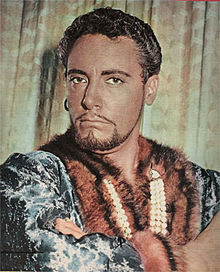|
SATURDEE OPRY LINKS 34:
Unbridled Emotion Edition

Mario del Monaco
Saturdee Opry Links Overture!
Saturdee Opry Links Overture.
Franz von Suppé: Poet and Peasant Overture
(Operetta long eclipsed; only the overture remains.)
https://www.youtube.com/watch?v=Y3zuLNlO6hQ
1.
Saturdee Opry Links opens with a great aria of self-pity. I can relate! Here is
"La vita è inferno all’infelice…O tu che seno agli angeli" from Verdi's "La
Forza del Destino." Sung by Beniamino Gigli.
https://www.youtube.com/watch?v=Amnwcy33Xc4
Setting: Italy, near the town of Velletri
Synopsis: Don Alvaro, Leonora's half-Indian suitor, is musing on his lost love -
Leonora. He decries the fate that befell his parents and denied his royal
throne. He has come to Italy as Captain of the Spanish Grenadiers to fight in
the army.
Translation, and a few other versions:
http://medicine-opera.com/2010/05/la-vita-e-inferno-allinfelice-o-tu-che-seno-agli-angeli/
2.
Here is the greatest fake Italian aria ever written. It's so convincing in
beauty and emotionality (and rather overblown poetry) that it could take its
place legitimately in the pantheon (whatever a pantheon exactly is) of great
Italian arias. It was written by Richard Strauss for his opera, "Der
Rosenkavalier," for a scene where "An Italian Tenor" entertains Princess Marie
Therese von Werdenberg in her boudoir. This is "Di Rigori Amato," sung by Mario
Lanza, accompanied by Jacob Gimpel at the piano.
https://www.mariolanzatenor.com/di-rigori-armato.html (See top.)
(for translation, scroll down on the Lanza page link above.)
3.
In today's Unbridled Emotion edition of Saturdee Opry Links, we turn to the
unbridled schmaltz of the Franz Lehar operetta classic, "Dein ist Mein Ganzes Herz," here "impassioned" by
Placido Domingo (who is about to take on his 150th role in opera performances!)
"You are my heart's delight!"
https://www.youtube.com/watch?v=5flrLic84G0
About the aria, translation:
https://en.wikipedia.org/wiki/Yours_Is_My_Heart_Alone
4.
"Put on the costume." Get on with it. "Vesti la Giubba," from "Il Pagliacci" by
Leoncavallo, perhaps never got such an investment of feeling as it does here
from Mario del Monaco, live on stage in Japan. Rather astonishing.
https://www.youtube.com/watch?v=7Xv1-vxnu-g
Setting: The entrance to a village, Calabria, Italy, 1860s
Synopsis: Canio, the head of a traveling performing troupe, sings that, although
his love has betrayed him and his heart is broken, he must go on and show a
cheerful face to the world.
Translation:
http://www.aria-database.com/search.php?individualAria=595
5.
Crazed tenors need not be crazed in order to put emotion across, as is here
exemplified by Tito Schipa singing the eternally lovely "M'appari" ("She
appeared to me") from "Martha," by Flowtow. Schipa was a "tenore di grazia," or
"graceful tenor," essentially a lighter tenor voice.
https://www.youtube.com/watch?v=d83ODZFFP04
Setting: A hunting park in Richmond Forest, England, 18th century during the
reign of Queen Anne
Synopsis: After meeting Lady Harriet the night before disguised as "Martha",
Lionel sees her again with the ladies-in-waiting for Queen Anne. He is struck
again by her beauty and grieves that he will probably never be with her again.
Translation:
http://www.aria-database.com/translations/martha15_mappari.txt
Pavarotti reacts to, and explains the greatness of Schipa:
https://www.youtube.com/watch?v=Thrb-ZZGsTc
6.
Here is the elegant, gorgeous duet from Verdi's "La Traviata," "Un di felice
eterea" ("One happy day.") Sung by Nicolai Gedda and Anna Moffo. What? Elegant?
Right, it's not "unbridled emotion." (Sue me.) Opera often deals in, uh, bridled
emotions, expressed in the most artful fashion.
https://www.youtube.com/watch?v=Jvn5O7QsY5Q
Translation:
http://www.opera-arias.com/verdi/la-traviata/un-di-felice-eterea/
Synopsis:
From the next room, the sound of the orchestra is heard and the guests move
there to dance. After a series of severe coughs and almost fainting, Violetta
begins to feel dizzy and asks her guests to go ahead and to leave her to rest
until she recovers. While the guests dance in the next room, Violetta looks at
her pale face in her mirror. Alfredo enters and expresses his concern for her
fragile health, later declaring his love for her (Alfredo, Violetta: Un dì,
felice, eterea – "One day, happy and ethereal"). At first, she rejects him
because his love means nothing to her, but there is something about Alfredo that
touches her heart. He is about to leave when she gives him a flower, telling him
to return it when it has wilted, which will be the very next day.
7.
Here is remarkable Anna Netrebko in her more recent assaying of heavyweight
roles (accompanied by heavier weight.) This is the poignant, wrenching, "La
Mamma Morta," from "Andrea Chenier," by Giordano.
Setting: The Revolutionary Tribunal.
https://www.youtube.com/watch?v=-s7Ep5bbz64
Synopsis: Maddalena tells Gérard about the death of her mother in the flames of
her home that was burned by a mob. She tells of Bersi selling herself on the
streets to provide for her. During her misery, love came to her and gave her the
kiss of death. She finishes by telling Gérard to take her body for Chénier's
life.
Translation;
http://www.aria-database.com/search.php?individualAria=47
8.
The composer Franco Alfano is known chiefly for having finished Puccini's "Turandot,"
but he wrote four operas of his own. Here, from his "Cyrano de Bergerac," are
Jennifer Rowley as Roxane and Atalla Ayan as Christian. Roxane confesses having
fallen in love with Cyrano's words, not the man who spoke them. With English
subtitles.
https://www.youtube.com/watch?v=WGQVpKiCa2k
9.
Roberto Alagna (still going strong in mid-50's) and Angela Gheorghiu were still
married at this point, so it is reasonable to assume that some of the emotions
of this scene are quite real. Either that, or they were great actors. From
Puccini's "La Boheme," the duet, "O Soave Fanciulla," ("O Beautiful Girl in
Moonlight.")
https://www.youtube.com/watch?v=_tBY7Z-OHsM
Translation:
http://www.mldb.org/song-176544-o-soave-fanciulla.html
The Operatic Break-up:
https://www.telegraph.co.uk/culture/music/opera/10154635/Operas-most-famous-couple-divorce-Angela-Gheorghiu-accuses-Roberto-Alagna-of-violence.html
FINAL BOW:
Is there a more anguished aria in opera than "Dio! mi potevi scagliar" from
Verdi's "Otello?" Here, on stage in Tokyo in 1959, is Mario del Monaco, the man
who could not sing quietly.
https://www.youtube.com/watch?v=fj9jopGunXY
Setting: The great hall of the castle.
Synopsis: Otello questions Desdemona about her relationship to Cassio and,
receiving no satisfactory answer, he commands her to leave. After she is gone,
Otello asks God why he has afflicted him in this manner.
Translation, and performances of the same aria by Mario Lanza:
https://www.mariolanzatenor.com/otello-monologue-and-finale.html
Back to Opera Links
Back to Home Page
|



